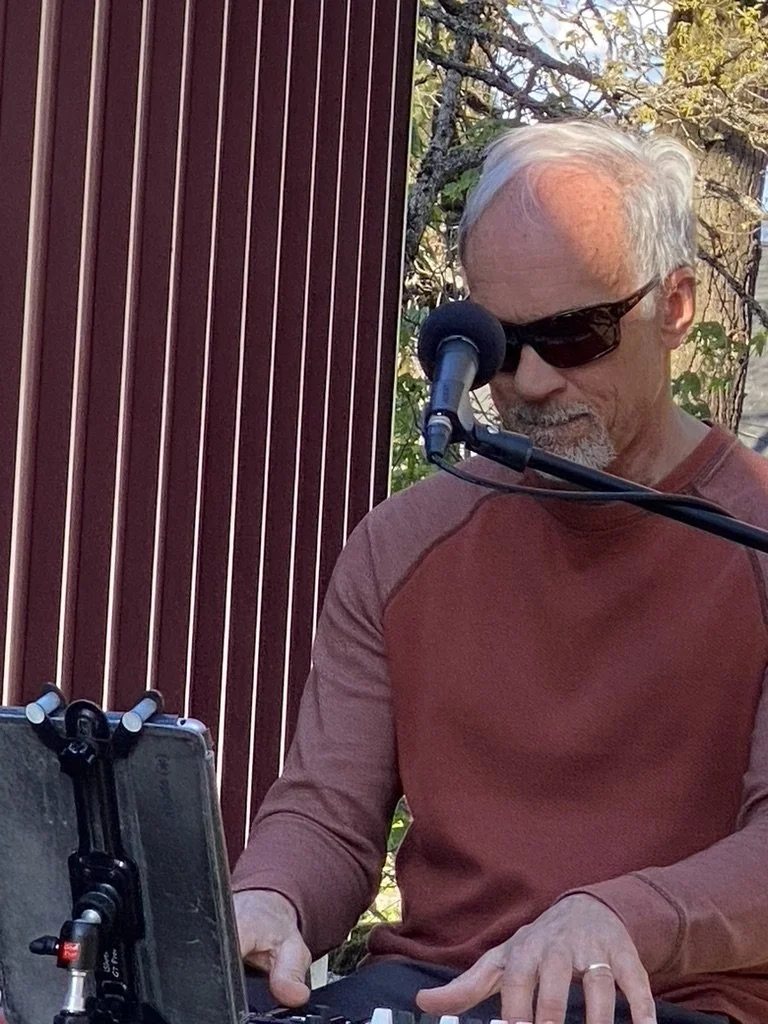Column: Good Vibrations: the Healing Powers of Music
Living Well by Donna Henderson
Columnist Donna Henderson singing at Phelps Creek Winery.
Several years ago, during a period of exceptional life-stress, I went through a several-month episode of depression that included (among other experiences), constant, intense anxiety and a generally depressed mood. And while I credit my eventual recovery to a combination of factors (acupuncture and talk therapy were especially helpful), I made a surprising discovery about the powerful effect of music on mood.
In the middle of my depressive episode, I was asked to sing at a graduation reception. Although I felt in no way up to the task, I agreed, because of the importance to me of the people involved.
So I chose the songs and grimly started to practice…which is when I made the discovery that whenever I was engaged in singing (sad or happy songs, it made no difference), I did not feel either anxious or depressed. When I stopped singing, my mood symptoms gradually returned, but it was startling and relieving to find that they could be eliminated immediately, even if temporarily, by singing!
It felt as though the activity of singing changed something in my brain and nervous system.
Rich Sutliff, Donna’s husband, on left and Steve Ellis.
So I got interested in learning more about that, and it turns out that that’s exactly what music does: it directly and immediately affects our brains.
How does this work? In part, it’s because the beat, timbre (the sound quality or “texture” ), rhythm and pitch of music are registered by, and activate, the very parts of the brain that regulate emotions and mood. When activated, these parts of the brain, in turn, release both the hormones (such as serotonin) involved in our overall sense of well-being and ability to cope with stress (you could call that our emotional “climate”), and also flood the body with the neurotransmitters (dopamine and norepinephrine) that make us feel especially good in a given moment (what you might call our emotional “weather”).
In fact, there’s a ton of research demonstrating the positive effect that music has on our physical, emotional and spiritual health and well-being, the most fascinating (to me) of which has to do with the way particular tones, pitches and rhythms resonate in the body, and the specific therapeutic effects that the healing practice of what is called “toning” produces. I’m looking forward to learning more about these, and to sharing them with you.
Tim Mayer at Phelps Creek
Meanwhile, here are just a few of the ways that listening to or playing music can tune up (couldn’t resist) our mental health .
1. Pain and distress. Music can significantly reduce the perceived intensity of pain. Some research suggests that using specific rhythmic stimuli (music, and other sound combinations) can can ease symptoms of migraines, PMS, agitation and anger.
2. Sleep. In one study, listening to classical music was shown to effectively treat insomnia in college students. And there are several smartphone apps (“BiNaural Beats” is one we are experimenting with) that are designed to produce sounds that stimulate the brain to shift into a restful state.
3. Cognitive performance. Background music appears to enhance performance on cognitive tasks for many people, although the most recent research suggests that this only occurs if the music first makes the subject feel better emotionally!
4. Meditation. Listening to slow musical beats can alter brainwave speed, creating the peaceful state of brainwave activity similar to that which occurs during meditation. Recently, I’ve started adding “ambient music” of this kind to my own meditation practice, and found it to be very helpful: my busy thoughts calm right down!
5. Depression. Science confirms what I experienced: that playing or listening to music can relieve symptoms of depression. And while I found that singing either sad and happy music had the same positive effect, research suggests (and this makes sense to me) that when listening to music instead, the kind of music matters: classical and meditative sounds seem to have an uplifting effect, while harsh, “angry” and dissonant music (like heavy metal and techno) can make depression symptoms worse.
6. Anxiety. One study found that music's effect on anxiety levels is similar to the relaxing effect of getting a massage! What’s not to like about that?
If you listen to music, pay attention to the effect that the kind of music you listen to has on your mind and mood, and consider experimenting with the other kinds.
If you already sing and/or play a musical instrument, you probably already know what I’m talking about concerning the effect of playing and singing on mood. And if you haven’t yet started bringing your own body into making music, do consider ways to join the fun, even just to see what the results are. Karaoke, a choir, or a music jam are great, low-pressure ways to have fun with music with others. Too shy to sing with others? There’s always the car, or the shower (just don’t try to accompany yourself there on your electric guitar!).
And for an incredible story of how music saved a life, read my friend Cassio Vianna's blog post written on the anniversary of the date of that event."
Play on!
Support Local News
Available to everyone. Funded by readers.




